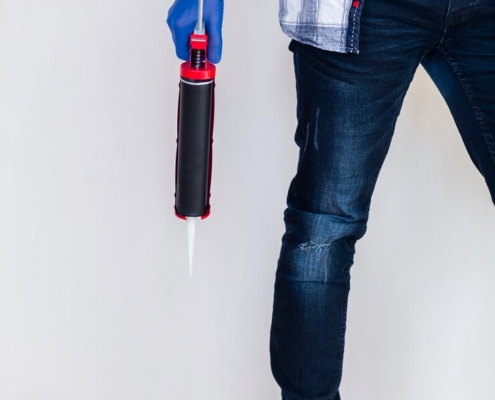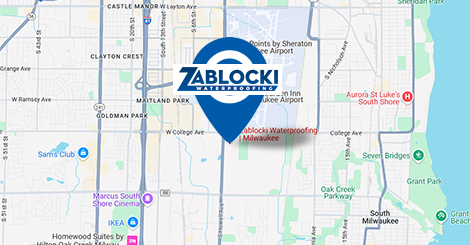 It may come as a surprise, but professionals in the American home inspection industry have estimated that as much as 60% of U.S. homes have wet basements, and that over half of those homes are at increased risk for mold growth. The hazards of moisture and mold in a home are widespread, and can even be deadly if not properly addressed.
It may come as a surprise, but professionals in the American home inspection industry have estimated that as much as 60% of U.S. homes have wet basements, and that over half of those homes are at increased risk for mold growth. The hazards of moisture and mold in a home are widespread, and can even be deadly if not properly addressed.
Discussions about basements and foundations might make you worry about a high price tag, but there are DIY steps you can take as a homeowner to fix minor basement moisture issues. The most important thing to determine first is what kind of basement moisture problem is present: condensation, runoff, flood damage, seepage, or something else. From there, actions can be taken to properly address the issue with either a simple DIY approach or by bringing in the professionals.
If you have noticed moisture in your basement, read on for our trusted basement leak prevention tips and strategies.
Jump to article sections:
- Basement Moisture Issue: Condensation
- Basement Moisture Issue: Runoff
- Basement Moisture Issue: Underground Seepage
- Signs of a Basement Leak You Should Never Ignore
- Essential Tools and Supplies for DIY Basement Waterproofing
- When to Call a Professional for Basement Leak Repair
1. Basement Moisture Issue: Condensation
Condensation appears in your basement as droplets of water on foundation walls and floors. This happens when warm, moist air in the basement comes into contact with the cold foundation walls, much in the same way that a cold beverage on a hot day appears to “sweat.”
Condensation can be easily confused with other types of basement moisture issues such as underground seepage or runoff. However, an easy test can tell you if condensation is the culprit: tape a piece of aluminum foil over wet spots, and check back the next day. If new dropets have formed on top of the foil, then you are dealing with a condensation issue.
To address the problem of condensation, start by using a dehumidifier to remove moisture in the air. If your basement has windows or doors, open them to allow the space to ventilate. Also, insulate cold water pipes with wrapping to prevent sweating. There are also waterproof coatings you can purchase to seal foundation walls and prevent condensation.
2. Basement Moisture Issue: Runoff
If your basement walls are wet after a heavy rainstorm or significant snow melt, it is likely that water runoff is a source of basement moisture in your home. To address runoff issues, start by ensuring that the soil surrounding your home is properly graded. A good rule of thumb is that the soil (preferably a clay-based soil) should slope away from your house at least 1 vertical inch for every foot of horizontal distance (i.e. 1” rise for every 1’ run).
In addition, ensure that your downspouts are clean, and install extenders that direct any water further away from the foundation. Make sure your gutters are clean and that they allow for efficient, leak-free water flow.
3. Basement Moisture Issue: Underground Seepage
Underground seepage issues look a lot like symptoms of runoff, with one major difference: they are present all the time, not just during storms or snow melt. These issues are due to high groundwater impeding your home’s underground drainage systems from functioning properly.
Minor seepage issues may be responsive to a DIY fix. For example, it is possible that all that is needed is an injection of absorbent clay into the soil or a polyurethane caulk into basement wall and floor cracks.
However, a professional may be needed for more extensive solutions, which can include excavation and installation of drain tile systems and/or sump pump systems to assist in water drainage and redistribution. These kinds of solutions can be quite time consuming and complex, and should be left to a licensed professional.
4. Signs of a Basement Leak You Should Never Ignore
Basements are often the most neglected part of a house, and it’s easy to see why. They’re typically dark, damp, and sometimes an afterthought in terms of design and maintenance. However, ignoring your basement can lead to serious issues such as mold growth, structural damage, and even health hazards for you and your family.
One of the most common problems that can arise in basements is water leakage. It may seem like a minor inconvenience at first, but if left untreated, it can cause major headaches down the line. So how do you know if your basement has a leak? Here are some signs you should never ignore.
Musty Odor
If you start noticing a musty, damp smell in your basement, it could be a sign of water leakage. This odor is often caused by mold growth, which thrives in moist environments. If you can’t seem to get rid of the smell no matter how much you clean or air out your basement, it’s time to investigate further.
Visible Mold Growth
Mold loves moisture and darkness, making basements the perfect breeding ground. If you start seeing black or green patches on your walls or ceiling, it’s a clear indication that there is excess moisture present. Not only does mold look unpleasant, but it can also cause health issues such as respiratory problems and allergies.
Staining on Walls or Floors
If you notice any discoloration on your walls or floors, it could be a sign of water damage. This can happen due to leaks in pipes, cracks in the foundation, or poor drainage. Staining may also indicate the presence of mold.
5. Essential Tools and Supplies for DIY Basement Waterproofing
 When it comes to DIY basement waterproofing, having the right tools and supplies is half the battle. Start with waterproofing sealants, which are perfect for filling small cracks and gaps to create a watertight barrier. For added protection, waterproofing membranes are essential; these durable sheets can be applied to walls and floors to block out moisture entirely.
When it comes to DIY basement waterproofing, having the right tools and supplies is half the battle. Start with waterproofing sealants, which are perfect for filling small cracks and gaps to create a watertight barrier. For added protection, waterproofing membranes are essential; these durable sheets can be applied to walls and floors to block out moisture entirely.
A sump pump is another must-have item, especially if your basement tends to collect water during heavy rains. It works by redirecting water away from your home to keep your space dry. Crack repair kits are also invaluable, as they allow you to tackle foundation cracks with ease, ensuring a long-lasting fix. With these essentials in hand, you’ll be better equipped to tackle leaks and safeguard your basement from water damage.
6. When to Call a Professional for Basement Leak Repair
While there are many DIY solutions for basement leak repair, there may come a time when it’s best to call for a professional basement waterproofing contractor. Here are some situations where you should consider hiring a licensed contractor:
- If your leaks are caused by major structural damage, such as large cracks or foundation issues
- If you’re unsure of the source of the leak and need an expert opinion
- If you don’t have the necessary tools or experience to properly fix the issue yourself
- If your basement continues to leak after attempting DIY repairs
For Milwaukee basement waterproofing and foundation repair, reach out to Zablocki Waterproofing. At Zablocki Waterproofing, we have decades of experience and can efficiently and effectively diagnose and repair any basement or foundation issues. Our team of experts will work with you to find the best solution for your specific needs and provide long-lasting results.
Don’t let a leaky basement ruin your home’s foundation and put your family’s health at risk. Contact us today for a free consultation!
 By Dale Granbois, co-owner of Zablocki Waterproofing
By Dale Granbois, co-owner of Zablocki Waterproofing
Dale Granbois is the proud co-owner of Zablocki Waterproofing, the premier basement waterproofing and foundation repair service provider in Milwaukee. Our team of experienced professionals offer a variety of services from complete basement waterproofing solutions to structural foundation repairs -all designed to keep your home or business safe and dry. Let us save you from expensive headaches caused by water damage and give you peace of mind with a safe and secure property. Contact us today for more information!





